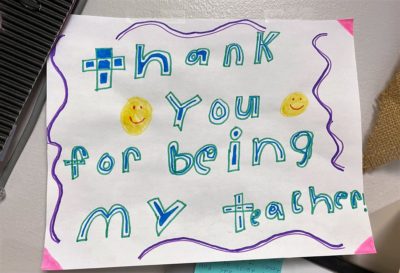
What a difference four years, or two years, can make — or not? This year’s summertime pull-and-tug between the power centers on Jones Street and Capitol Square has a movie-rerun familiarity, with the ending now still in doubt.
In 2017 and 2019, Democratic Gov. Roy Cooper vetoed the omnibus General Fund budget adopted by the Republican-majority General Assembly — with teacher pay and tax cuts at the center of their differences. In 2017, the legislature voted to override Cooper’s veto. In 2019, the governor’s veto was sustained, resulting in a long stalemate and no general salary increases for educators for two years.
The 2021 rerun comes in the wake of a contagious virus that brought death to hundreds of thousands, disrupted the economy, and closed schools, setting principals, teachers, social workers and cafeteria staffs scrambling in over-drive to find absent students, to feed families, and to teach online instead of in class. It also comes with a mind-bending bulge in revenues flowing from the stimulus of federal pandemic relief and from taxes collected from well-paid employees who kept their jobs as the state’s economy has rebounded.
In the 2020 election, the 5.54 million North Carolinians who cast ballots returned a divided government to the state capital. The differences between the Democratic governor and the Republican legislative leadership run deeper than simply personal rivalry and sheer partisanship; they differ on the quantity and quality of government itself.
“Education is the fuel that fills the tank of our economy,” Cooper once said in explaining a 2017 budget veto. “If we don’t get serious about doing more for our students, our economy will suffer.”
“A huge surplus does not mean we’re spending too little,” said Republican leader Phil Berger as the Senate’s current budget bill was in the works. “It means we’re taxing too much.”
The budget that emerged in the Senate this week indeed looks toward larger tax cuts than originally proposed — which if adopted would further erode the state’s tax base for years to come. In developing its budget, the Senate leadership self-imposed a spending limit of $25.7 billion for 2021-22 and $26.7 billion for 2022-23 — billions below available revenue. Cooper’s budget, released before the recent upward revenue revision, calls for $27.4 billion in 2021-22 and $28.5 billion for 2022-23.
In its current budget, the Senate actually proposes teacher pay increases well below the salary increases Republican legislators themselves supported in 2017 and 2019. Even in the wake of the pandemic and of the revenue bulge, Senate Republicans offer below-paltry 1.5% average raises for each year of the biennium — thus slightly over 3% — plus a state-funded bonus of $300 and federal-funded bonus of $1,000 to $1,500.
For his part, Cooper seeks teacher pay increases averaging 10% over two fiscal years, along with a series of bonuses adding up to $4,000. The governor also proposes modest tax cuts targeted toward middle- and lower-income individuals.
Is the state headed toward another budget-veto clash? The answer depends on how House Republicans respond in their budgeting — and on subsequent House-Senate and legislative-executive negotiations. Yes, there’s politics involved, but there’s also the need to meet the challenges of building and sustaining a high-quality, more diverse corps of public school teachers.
In assessing teacher pay, it’s more relevant to look at compensation in comparison with similar professionals than at shifting state-by-state rankings. On its website, the nonpartisan Southern Regional Education Board has a teacher compensation dashboard on salary, health coverage, and retirement benefits. In North Carolina, says the SREB, teachers earn 25.3% per week less than “similarly educated peers.” For comparison among neighboring states, South Carolina falls 13.1% short, Tennessee 21.4%, Georgia 25%, Virginia 32.7%.
In an analysis earlier this year, the Education Policy Initiative (EPIC) at UNC-Chapel Hill found that “white students frequently have White teachers; it is rare for students of color to have a same race teacher.” Such a distribution, EPIC reported, “compounds inequalities.”
For many teachers, the classroom is their natural habitat, the job a passion not driven by money. And yet, noncompetitive pay has opportunity costs — in young people deciding not to enter schools of education, in well-trained teachers leaving too soon, in classrooms, labs, and gyms without Black and Hispanic teachers and coaches who would lift the achievement of today’s multi-ethnic North Carolina student body.
The budget pull-and-tug, of course, is not just an inside-government power struggle. It also will signal North Carolina’s commitment to building careers for more high-quality professional educators.




